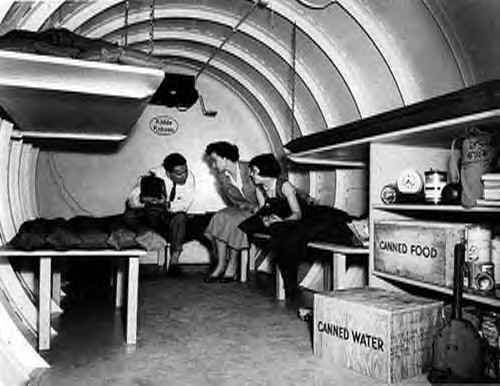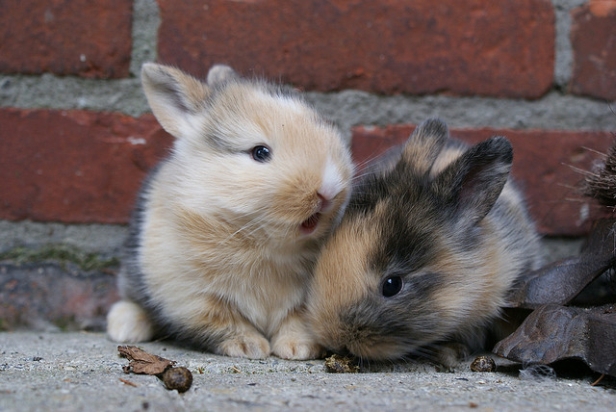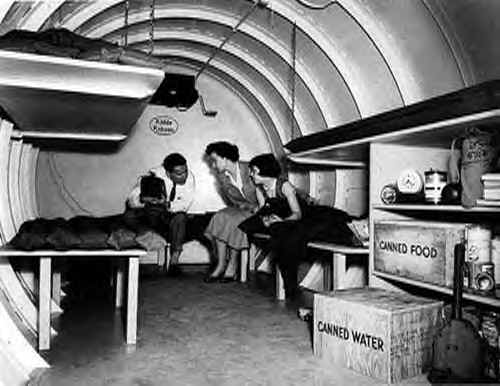 Gimme shelter: The doomers probably wish we could bring back the 1950s fallout bunkers. In spring 2008, Wall Street was mired in crisis, food prices were rising briskly, and gas was selling near all-time highs. I noted that a bit of Chuck Norris-style “The end is nigh!”-ism seemed to be creeping into popular culture, which prompted me to write a blog post called, “More than peak oil or financial crash, I fear angry men armed to the teeth.”
Gimme shelter: The doomers probably wish we could bring back the 1950s fallout bunkers. In spring 2008, Wall Street was mired in crisis, food prices were rising briskly, and gas was selling near all-time highs. I noted that a bit of Chuck Norris-style “The end is nigh!”-ism seemed to be creeping into popular culture, which prompted me to write a blog post called, “More than peak oil or financial crash, I fear angry men armed to the teeth.”
My point was that in hard times, the real path to survival isn’t private caches of guns, ammo, and canned food. It’s robust public institutions, diverse and plentiful food sources, and vibrant communities.
Predictably, my musings inspired some backlash. After carefully mulling my arguments, a writer on a blog called Notes from the Bunker concluded, “Still and all, the article makes me wanna go over there and kick the guy in the ‘nads.” Back in the comments section of Grist, a reader cheerfully predicted that “Tom will die, and probably be eaten by all the people in his commune that don’t know how to provide for themselves outside of going down to the local store that ‘magically’ restocks itself every day.”
Well, so far I have survived, and even avoided physical attacks from angry survivalists. I innocently assumed that the doomer strain in pop culture subsided with Wall Street’s revival and the easing of gas prices. But now I find that survivalism is more mainstream than ever — Glenn Beck is evidently flogging it on his Fox News show, which commands some 2 million viewers.
For months, it seems, Beck has been urging his audience to buy gold as a hedge against global financial collapse. I’ve never understood the appeal of gold-buggery to the end-is-nigh set. What do they plan to eat when the apocalypse comes — gold coins?
Well, Glenn’s got you covered on the food front, too. He’s been promoting the wares of a company called Food Insurance, which sells … well, let Glenn explain:
Now, Beck and his two weeks’ supply of dehydrated beef stroganoff and lasagna could hardly be more buffoonish. (It’s just $199! There’s a range of packages, all the way up to a one-year, big-family, 3,792-entree kit for $9,599. Financing available, of course.)
I don’t want to make light of the idea that societies should prepare for hard times. The economy remains dismal, oil production has officially peaked, and climate change proceeds apace, uninhibited by global or U.S. policy.
In other words, we are facing a high level of uncertainty. But there are other visions for how to prepare than buying gold coins and pre-stocked backpacks. On the national level, if we really wanted “food insurance,” we could revive the long-discarded New Deal policy of keeping a national grain reserve — storing grain in flush times to be used in lean.
But of course, what hasn’t already been dismantled from the New Deal is under severe attack precisely from the likes of Beck. As the recently deceased historian and essayist Tony Judt put it in his great 2009 essay, “What is Living and What is Dead about Social Democracy“: “Why have we been in such a hurry to tear down the dikes laboriously set in place by our predecessors? Are we so sure that there are no floods to come?”
With the national political debate poisoned by the likes of Beck, Judt’s vision of robust social institutions that would buffer society as a whole from coming shocks looks increasingly like a pipe dream. But that doesn’t mean you have to hunker down with boxed lasagna. Building food security at the community and city level — the kind of organizing that I saw this past summer in Detroit — seems like a better way forward to me.



